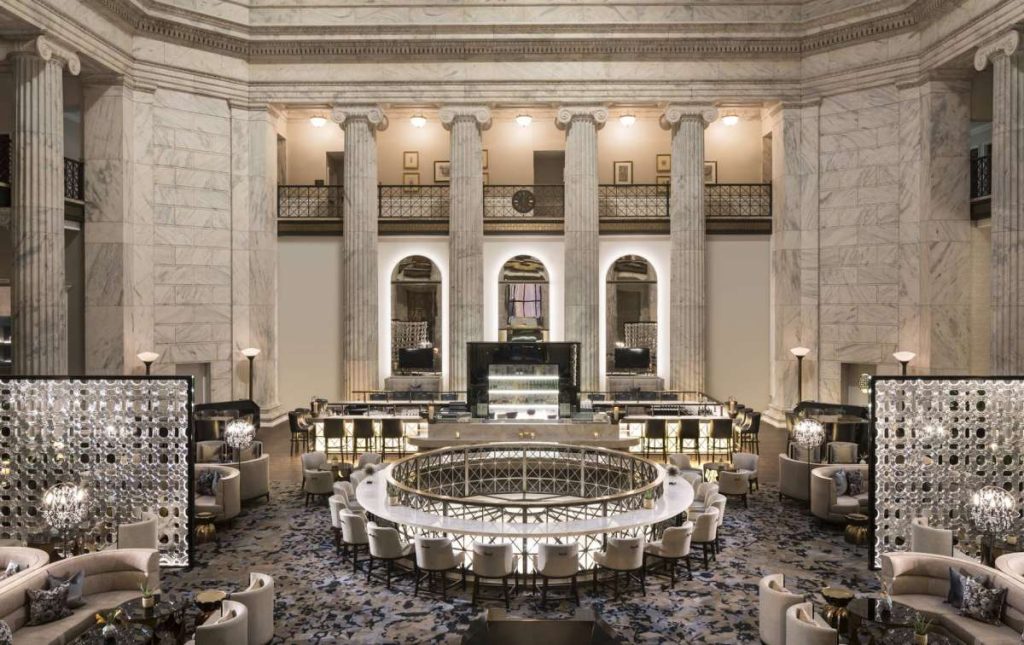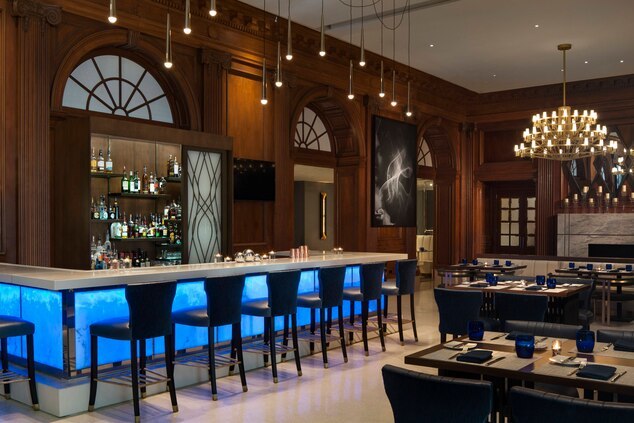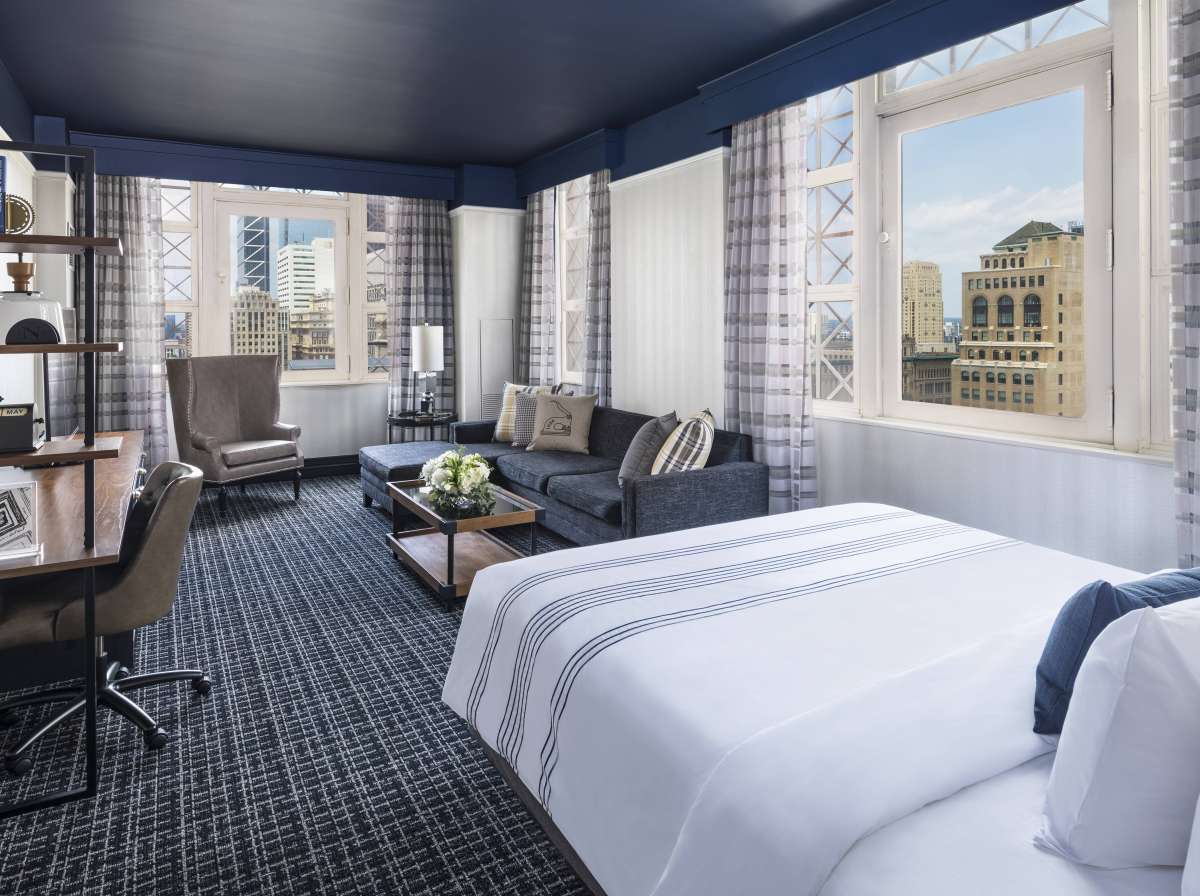The landmark Loews Philadelphia was the first international-style skyscraper in the United States. At 33 stories, the former Philadelphia Savings Fund Society (PSFS) building commanded the skies in the early 1930s and served as a hub for the most prominent business leaders of the time…reports Asian Lite News
Philadelphia is a city steeped in history,that includes a variety of historic hotels, that showcase the style and refinement of that bygone era. From their stately facades to opulent interiors, Philadelphia’s historic hotels offer a refined journey back in time, combining old-world charm with modern comfort.
One of Philadelphia’s boutique hotels, The Notary Hotel, Autograph Collection, occupies the historic City Hall Annex. The hotel’s theme is notary or “stamp of approval,” which is a nod to the original purpose of the building, listed on the National Register of Historic Places. Designed by Philip Johnson and built in 1926, the 18-story annexe was originally where residents would go to get official documents notarised. The building, designed in the Classical Revival style, has large stone archways on the first floor and columns on the exterior of the building. Inside, many of the original details of the building have been preserved.
Aloft Philadelphia Downtown combines modern design with the city’s deep-rooted history. Taking over the 21-story 1925 Liberty Title building, this hotel is adjacent to the Pennsylvania Convention Center and a block from City Hall. It perfectly preserves the old-time elegance (think impressive ceiling designs, monumental windows, detailed crown moulding and marble flooring) and blends it with innovative amenities and hip social spaces (including a chic rooftop bar).

Just steps from City Hall, the Ritz-Carlton, Philadelphia is situated in the former Girard Trust Bank and Girard Trust Building. Modelled after the Pantheon in Rome, the bank building was designed by architect Frank Furness and completed in 1907. It’s easily identified by its pillar and masonry dome, which is hemispherical on the exterior and octagonal on the interior. The four-story banking room serves as the hotel’s restaurant and ballroom. Guest rooms are located in the attached trust building, a 30-story skyscraper that was built in the 1930s and has views of City Hall.
The landmark Loews Philadelphia was the first international-style skyscraper in the United States. At 33 stories, the former Philadelphia Savings Fund Society (PSFS) building commanded the skies in the early 1930s and served as a hub for the most prominent business leaders of the time. Developers of this stunning Art Deco structure even kept the three-story banking room and transformed it into an event space with the original bank safe, Cartier clocks and marble finishes still intact.
Renowned for its Georgian Revival architectural details—think ornate woodwork and striking black-and-white décor—Le Méridien offers guests an elegant and historic atmosphere. The classic space was once a YMCA as well as the district attorney’s office and now boasts some of the best views of the city skyline (including the William Penn statue perched atop City Hall). The hotel perfectly blends contemporary furniture and décor with the intricate original details of the building.

The iconic Bellevue Hotel, known as The Grande Dame of Broad Street, was constructed in 1904 by owner George Boldt (also the proprietor of the Waldorf-Astoria), known as the “Father of the Modern American Hotel” for pioneering the idea of a hotel as an experience. The hotel was recently refreshed with furnishings that put a modern spin on 18th-century styles. The guest hallways were specifically fashioned to allow Victorian gowns with hoop skirts (6 feet wide) to easily manoeuvre and the lighting and electricity throughout the hotel was designed by Thomas Edison.
Home to the Morris family for more than 120 years, the Morris House Hotel now invites guests to experience its rich past in one of the 17 guest rooms—each with different designs and decor. With a colonial-style façade, charming outdoor garden and prime location (just steps from the Liberty Bell and Independence Hall), you can’t help but feel immersed in the history and significance of this space.
The Warwick, on the National Registry of Historic Places, opened in 1928 has welcomed celebrities and prominent guests including U.S. Presidents, Hollywood celebrities, and athletes, including Jackie Robinson and the Brooklyn Dodgers. The limestone and brick building was designed by Frank Hahn, with classical and Renaissance features and houses The Prime Rib, an acclaimed Philadelphia steakhouse with décor inspired by the 1940s.

Step straight into the 18th century with a stay at the historic Thomas Bond House in Independence National Historical Park. The restored 1769 bed & breakfast has 12 unique guest rooms—each offering a one-of-kind stay. Built by Dr. Thomas Bond, a celebrated surgeon and a co-founder of the American Philosophical Society and Pennsylvania Hospital, the house served as a private residence until 1810. Since then, it’s held a stocking factory, leather tannery, rag supplier, customs broker and retail shop until its conversion to a B&B in 1988 by the National Park Service.
Also, in Philadelphia’s historic district and located adjacent to the Museum of the American Revolution, the Independence Park Hotel at 2nd and Chestnut streets is one of Philadelphia’s most historic boutique lodging options. Originally opened in 1856 on the site of a former brewery as a dry goods store, the National Historic Landmark building is now a boutique hotel with 41 rooms elegantly furnished with details that draw upon Philadelphia’s rich history. Closed due to a fire in 2018, Independence Park Hotel reopened to welcome guests once again in early 2022.
ALSO READ-Travel with a healthy mind

Leave a Reply